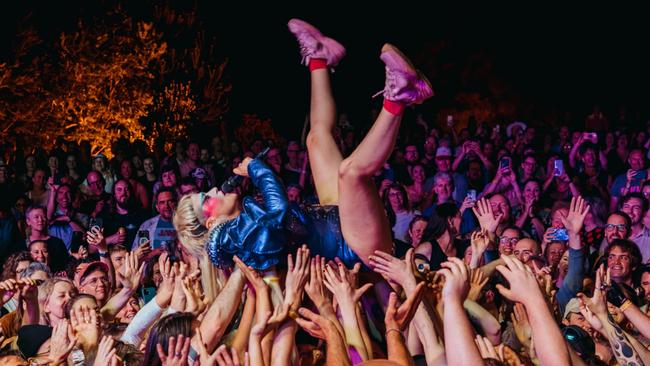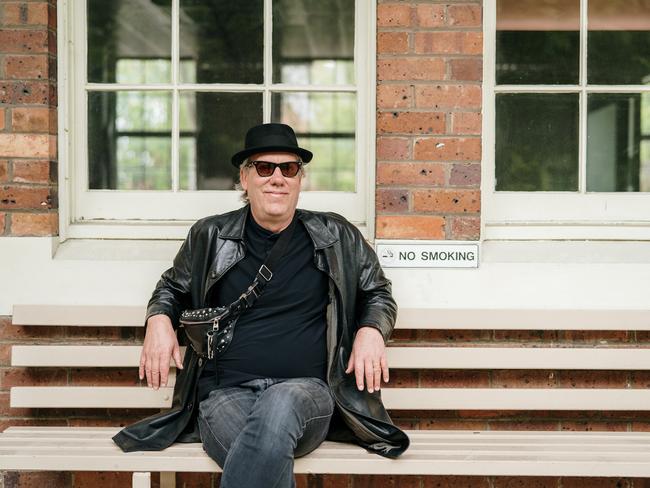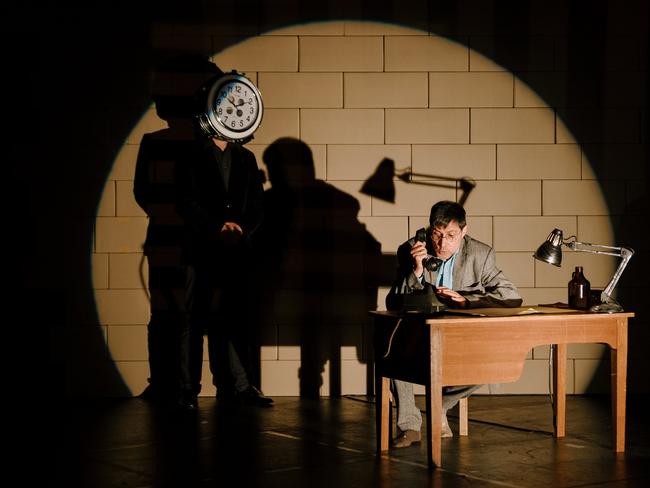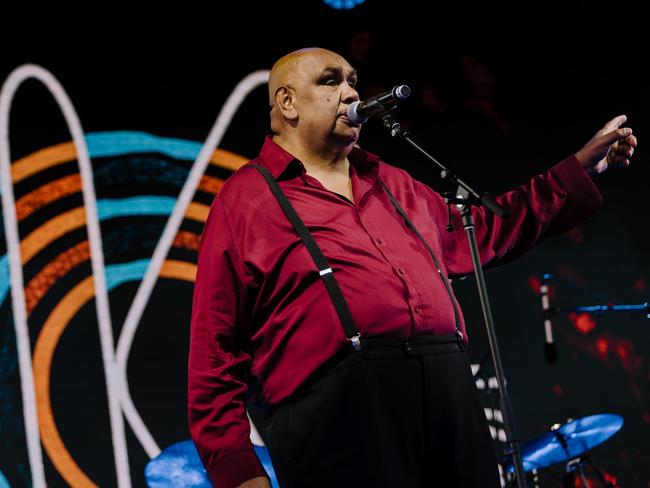Loud and bold, Mona Foma festival has matured
Hobart’s summer jamboree is ageing disgracefully well, as director Brian Ritchie turns up the volume and sharpens the political edge.

Preaching punk from a giant prophylactic and flanked by a brace of gyrating dancers, Canadian singer Peaches on Saturday reminded Tasmania what it had been missing since Covid interrupted normal programming.
“I know it’s not subtle. I know you think I’m trouble,” she spat at her show at Mona Foma festival, lolling about bare-breasted in an inflatable phallus. “Now loosen your buckle, Tasmania.”
The 56-year-old performer, real name Merrill Nisker, sent the masses into raptures with her hyper-feminist brand of punk pop as she belted out the hits from her 2000 album The Teaches of Peaches.
It was the kind of bold, cheeky energy artistic director Brian Ritchie had hoped to return to the Museum of Old and New Art’s annual summer arts jamboree, held over subsequent weekends in Launceston and Hobart. After two years of modest programming – Covid has for the past two years meant fewer international artists and smaller festivals – this year’s event was, as one punter described it, the real deal, with more than 370 artists performing.
The Launceston leg the week before had centred on the newly established reUNION district, a bespoke space for performance art. But the big party was happening in Hobart, headlined by musical stars such as indie folk legend Bon Iver, who played on Tuesday, and the weekend attractions in Peaches, Malian singer Vieux Farke Toure, Angel Olsen and feminist punk queens Bikini Kill.

Ritchie scored a classical coup in American contemporary composer Nicho Muhly, a protege of Philip Glass and artist in residence at this year’s festival. A selection of Muhly’s soaring repertoire was played by the Tasmania Symphony Orchestra on Saturday before he performed in a separate, and utterly compelling show, called A Life Sentence, with the TSO choral ensemble. Muhly was tasked with composing, in 30 minutes, a score set to a line of poetry chosen by the audience. At the end of the performance, the ensemble, sight-reading, sang it for the first time in all its complex beauty: a world premiere like no other.
It is perhaps a challenging time to host a festival in Tasmania.
The much-publicised Dark Mofo controversy two years ago, when the festival programmed an artwork calling for Indigenous blood, saw the winter event come perilously close to being cancelled, figuratively and literally. That experience led to a deeper engagement at MONA with the Indigenous community and a far less radical approach to programming by Mofo director Leigh Carmichael; his final Dark Mofo is in June.
With that in mind, Ritchie might have been forgiven for taking a safe road with Mona Foma, his 15th as artistic director. But this year’s festival was, if not overtly political, one that did not shy away from difficult conversations.
That intent was clear on opening night on the MONA lawns, where Songs for Freedom acted as a welcome to country, and to the festival.
Elders and songwriters from Roeburn in WA’s Pilbara region, under the musical direction of Lucky Oceans, performed an extended paean to country and Aboriginal Australia.
With the smell of smoking gum leaves, musicians and elders came together to celebrate, but also to commemorate John Pat, the Indigenous boy who 40 years ago died in the custody of WA Police and who would go on to become a symbol for injustice and oppression. It was a poignant moment on the day Zachary Rolfe – the policeman found not guilty of the murder of Yuendemu man Kumanjayi Walker – flew out of the country after claiming he “would have got a medal in any other jurisdiction”.

Another big conversation was taking place at MONA, with an immersive exhibition of the work of Argentinian artist and inventor Tomas Saraceno. Featured was a selection of the imposing aerocene orbs he hopes to sail across the sky, a photograph of the solar-powered air balloon he invented, and his compelling Hybrid Web series in which small glass cabinets display the delicate geometry of the webs of spiders he keeps in his Berlin studio.
The environment took centre stage at Rosny Barn, a historic sandstone building outside Hobart, where musicians Anna McMichael and Louise Devenish performed five pieces inspired by handwritten letters from climate scientists.
The Queer Woodchop set up shop on Saturday afternoon on MONA’s famous tennis court. The show does what it says on the tin, but its subversiveness lies not just in its clever inversion of the cliched Aussie woodchooper (Tasmania has had many world champions) but in the unspoken, painful acknowledgment that until 1997 homosexuality was still illegal in this state.
While Peaches and post-punk, all-female band Bikini Kill were channelling feminist power on the mainstage, pianist Gabriella Smart at the revamped Theatre Royal was engaging a power of a more ancient kind. Hammering a grand piano, she brought Primordial – a score by Constantine Koukias inspired by the Ediacaran fossils in the Flinders Ranges – to rich and vibrant life.

It was one of two IHOS Amsterdam productions performed over the weekend. The other, A Deep Black Sleep, a “film-noir opera” about a tortured composer in an authoritarian state that featured a live band – and, curiously, a live horse – spoke in a broad sense to the overarching theme of the festival: where is the line between art and politics?
If there is a line, it was drawn at The Party, Mona Foma’s four-night industrial dance event in the old Mercury building. DJs shadowed by menacing, antiquated printing machines – the air thick with sweat, vodka and ink – sent tunes blaring into the wee hours.
Back at Mona, as the final night of the festival unfolded, Indigenous singer Kutcha Edwards took the stage. “Thankyou for coming,” he said. “This festival, these songs, they belong to all of us.”
Mona Foma in 2023 has matured. The PR gimmicks of previous years – the festival-sanctioned onesies; the chartered party flights – were nowhere to be seen. Ritchie’s southern summer fiesta is bold, politically engaged, proudly local and internationally ambitious. Tasmania should loosen its buckle more often.
Tim Douglas travelled to Hobart as a guest of Mona Foma.


To join the conversation, please log in. Don't have an account? Register
Join the conversation, you are commenting as Logout